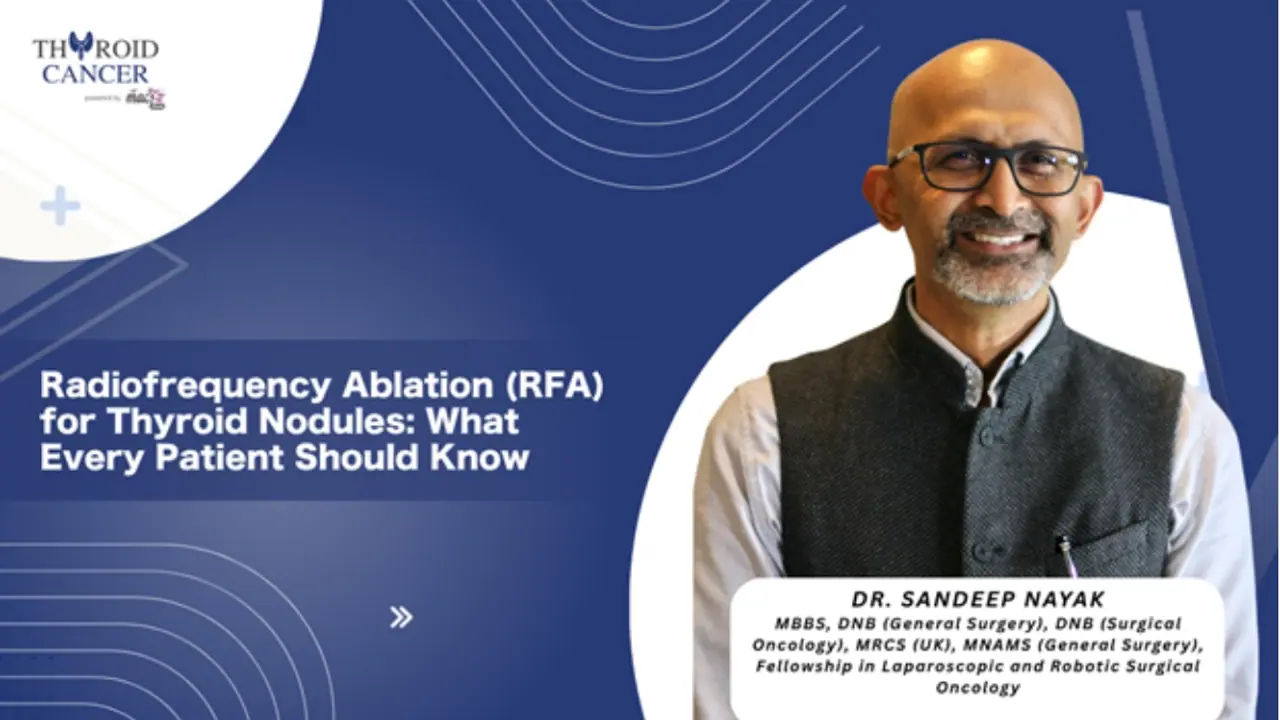Thyroid nodules are a common medical condition, often causing discomfort, cosmetic concerns, or even functional issues like difficulty swallowing.
Bangalore (Karnataka) [India], July 1 : In a significant stride toward non-surgical thyroid care, Dr. Sandeep Nayak, renowned Surgical Oncologist and Professor of Minimal Access Surgical Oncology at RGHUS, has brought renewed attention to a lesser-known yet highly effective technique for managing thyroid nodules—Radiofrequency Ablation (RFA). At MACS Clinic, a premier Thyroid Surgery and Care Resource in Bangalore, patients now have access to this minimally invasive approach that offers substantial benefits over traditional surgery.
Thyroid nodules are a common medical condition, often causing discomfort, cosmetic concerns, or even functional issues like difficulty swallowing. As a leading Thyroid Surgery and Care Resource, MACS Clinic emphasizes RFA as a transformative solution that delivers precision treatment with faster recovery and minimal scarring—without the need for general anesthesia or extended hospital stays. Radiofrequency Ablation (RFA) is a minimally invasive procedure used to treat benign (non-cancerous) thyroid nodules. Using ultrasound guidance, a thin, needle-like electrode delivers radiofrequency energy directly to the nodule. This energy generates heat, which reduces the size of the nodule by breaking down its tissue. Over time, the body absorbs the treated tissue, leading to noticeable improvements in symptoms and appearance. This technique is especially appealing because it avoids the need for traditional thyroid surgery, allowing patients to preserve their thyroid function and experience faster recovery times.
RFA has gained popularity for several reasons. Clinical studies have shown that RFA can reduce nodule volume by 67%–75% within a year, with long-term reductions up to 95%. If your nodule is causing pressure, discomfort, or visible swelling, RFA can significantly improve these issues. Patients often report feeling more comfortable and confident after treatment. Unlike surgery, RFA does not require large incisions or general anesthesia. Recovery is quick, and complications like vocal cord paralysis or hypothyroidism are rare (less than 2% of cases). RFA targets the nodule while leaving the rest of the thyroid gland intact. This means your thyroid can continue to function normally, reducing the need for lifelong thyroid hormone replacement therapy. Most people can return to their normal activities within 24–48 hours after the procedure.
RFA is not for everyone, but it is an excellent option for many patients with specific types of thyroid nodules. You may be a good candidate if you have a benign thyroid nodule that is causing symptoms or cosmetic concerns. Nodules between 2–4 cm in size, and even larger ones through multiple sessions, are commonly treated with success. It’s especially suitable for patients who prefer a less invasive option compared to traditional surgery or those who are not good candidates for surgery due to health conditions. Those who value preserving their thyroid function also benefit greatly. However, RFA is not recommended if the nodule is cancerous, highly suspicious for malignancy, or if it is entirely cystic. These cases may require different treatments, such as surgery or other ablation techniques.
RFA is performed as an outpatient procedure. Before the procedure, your doctor will confirm that your thyroid nodule is benign and suitable for RFA using imaging and biopsy results. You’ll be given local anesthesia to numb the area. Using ultrasound guidance, the doctor inserts a thin electrode into the nodule and applies radiofrequency energy to heat and reduce the nodule’s size. The procedure usually takes about 30–60 minutes. After the procedure, most patients experience mild swelling or discomfort, which resolves within a few days. You can return to work or your daily routine within 1–2 days.
Radiofrequency ablation (RFA) is revolutionizing the way we treat benign thyroid nodules. It’s safe, effective, and minimally invasive, making it a game-changer for patients seeking relief without the challenges of traditional surgery. With RFA, we can address patient concerns effectively without the need for invasive surgery. This aligns with our goal of making treatment less intimidating and more accessible, says Dr. Nayak. As more patients seek less invasive solutions, MACS Clinic remains at the forefront of thyroid innovation.
To learn more or schedule a consultation, visit the patient education portal:
Thyroid Surgery Decoded: A Comprehensive Guide for Patients
About Dr. Sandeep Nayak
Dr. Sandeep Nayak is an internationally recognized surgical oncologist and pioneer of minimal access cancer surgeries in India. He serves as Professor at RGHUS and is the Director of MACS Clinic, Bangalore. He has developed several breakthrough robotic techniques, including RABIT and RIA-MIND, to improve outcomes for thyroid and head & neck cancer patients.
Media Contact:
MACS Clinic
#12, 1st Floor, 1st Cross, Koramangala 1st Block, Bangalore – 560034
+91-9482202240


